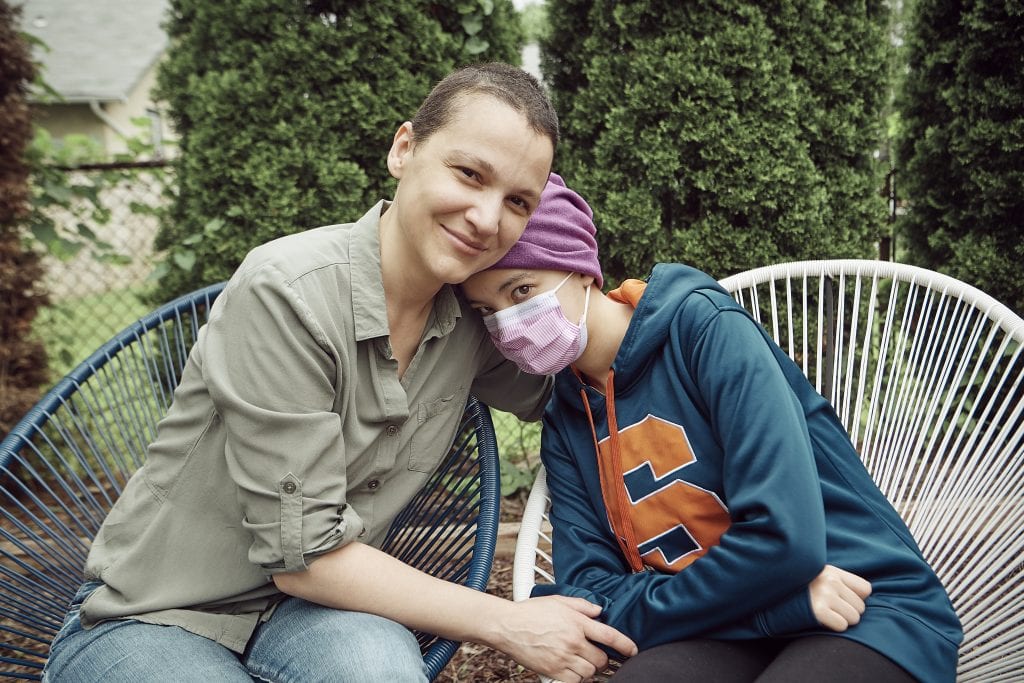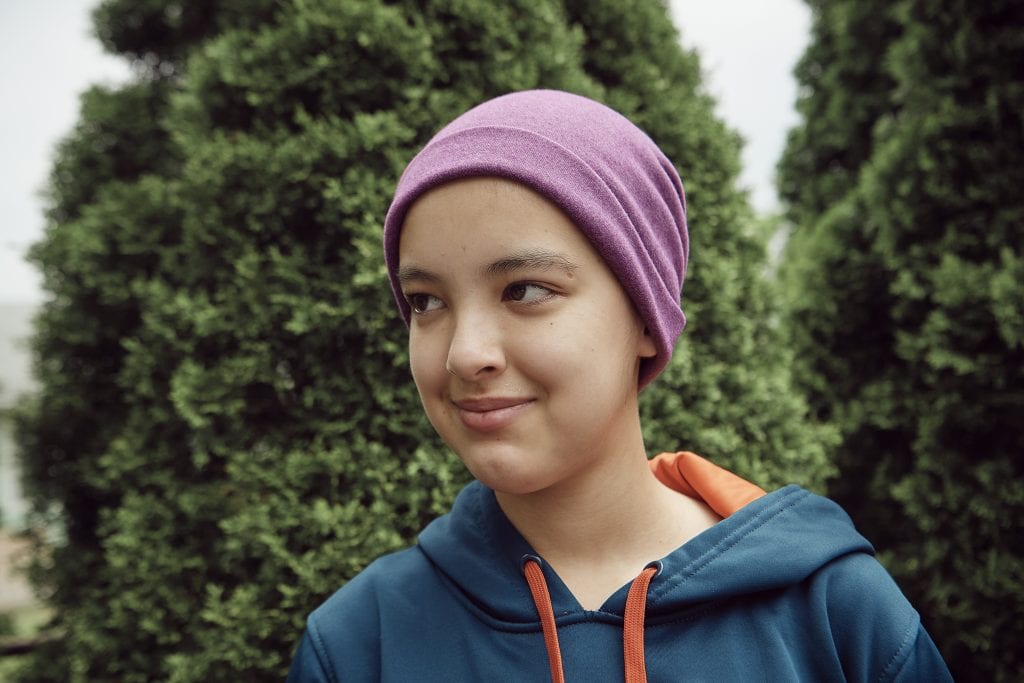Nick’s House Stories: Frida & Celia Menendez

Frida Menendez, 11, recovered at Nick’s House with her mother, Celia, after receiving a bone marrow transplant utilized to treat aplastic anemia. (Photo credit: Ed Cunicelli)
When Celia Menendez and her husband, Fernando, first noticed the severe bruises on their daughter’s body, they figured she was being bullied at school.
It began in 2015, when Frida Menendez was just 8 years old. Despite Frida’s insistence that none of her classmates were bullying her, the Menendez family, of Syracuse, N.Y., had to get to the bottom of what was ailing her.
“It started with nasty bruises,” Celia said. “Right before winter break she had a big one on her head (later discovered to have been suffered after a fall while playing hockey in gym class), so we decided she wasn’t going back to school because something felt not right.”
Frida was taken to the doctor, and although Celia later had additional concerns her daughter could have leukemia, Frida was diagnosed with severe aplastic anemia. Aplastic anemia is a condition in which the body’s bone marrow stops producing new blood cells, leaving the inflicted person more vulnerable to infection and severe bleeding when white and red blood cell and platelet counts drop too low.
Doctors put Frida on ciclosporin, an immunosuppressive drug, to treat the anemia, which in effect shut down her immune system and opened the door to the possibility of bad infection or the development of cancer cells. The family waited for almost two years for Frida’s blood cell count to rise, but it never happened. The next step for treatment was a bone marrow transplant, but Frida had no valid matches; however, during Frida’s treatment, Celia became pregnant and ultimately gave birth to a baby boy.
“He was her bone marrow match,” Celia said, the miracle they had been waiting for.
Frida was sent to Childen’s Hospital of Philadelphia (CHOP) for the transplant, which occurred on April 17 of this year. She was discharged from the hospital on May 4, and moved into the Nick’s House in Holmes, which Celia had been referred to by a CHOP social worker, one week later. Being isolated in the apartment, except for doctor’s appointments, has been key in Frida’s recovery, as a single-family home environment offers less risk of infection than a hotel.
“Being by ourselves here is the main thing, and we hope it allows us to go home earlier than expected,” Celia said. “Getting in here was key, because any infection she gets means we have to stay longer. The social worker was on top of everything, and we are two very lucky girls. When we got in here (to Nick’s House), I let out a big ‘wooooooo!’”

Despite battling aplastic anemia since she was 8, Frida maintains a positive attitude, focusing on her loves of drawing and playing musical instruments. (Photo credit: Ed Cunicelli)
Frida, now 11, has been enduring treatment since she was 8, so she and her mother were eager to return home to Syracuse the second week of June to hopefully begin forward progression to finally putting this saga behind them. In addition to her husband and young son who was Frida’s bone marrow donor, Celia also said she has a son with Down syndrome whom she misses greatly. Being so far from home, they hadn’t been able to see the rest of their family in more than a month prior to their departure in mid-June.
But as a mom, Celia would move to the ends of the earth to protect her child; in this case, the ends of the earth turned out to be Philadelphia.
“As a mom, you have to do it,” Celia said. “It’s what you sign up for, but never something you imagine. Not this. Only five to six million have this disease in the United States, and she’s in the 70 percent of those where they don’t know how or why it happens. She’s been dealing with something being wrong for so long that it’s become a normal thing for her. It’s impossible to take her on vacation or actually be normal, but eternal sadness isn’t going to help us, either.”
For her part, Frida seems relatively unfazed by her plight. She said she felt fine physically, and described her stay at Nick’s House as “really good.” When she’s not being shuttled to hospitals or checkups, Frida’s interests reside in drawing and playing musical instruments (in her case, the cello, saxophone and ukulele).
It will still take time for Frida to reach her next horizon, but now that she is two months post-transplant, she and Celia are back home in New York, where Frida will only be need to be seen by doctors once a month if all continues to go well in protecting her from infection.
CHOP and Nick’s House have played integral parts on Frida’s road to recovery, and the hope is that this chapter in her story will come to a conclusion soon.
“Without any infection, things can clear up pretty fast,” Celia said. “We’re looking toward the end, and we can see it in our sights.”
—
The HEADstrong Foundation™ is a 501(c)3 committed to improving lives affected by cancer, founded by the late Nicholas “HEAD” Colleluori. The non-profit organization plays a vital role as a direct resource to families overcome by the hardships of cancer. HEADstrong provides a variety of services, which range from financial assistance to funding capital projects to peer mentorship and, most notably, HEADstrong operates Nick’s House™, a guest family home providing more than 2,555 nights of complimentary lodging and support to families displaced in the pursuit of life-saving cancer treatment. Today, Nick’s vision is being fulfilled through the relentless efforts of his family, athletes and supporters across the country uniting in the fight against cancer. For more information on the HEADstrong Foundation and how to donate, host a fundraiser or volunteer, please visit www.HEADstrong.org.

D
O
N
A
T
E